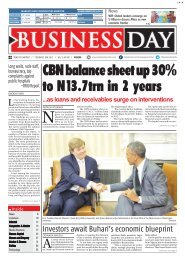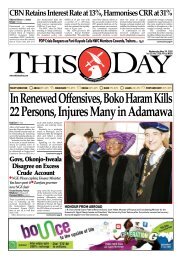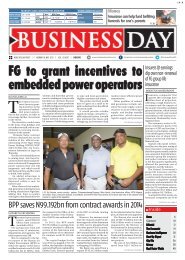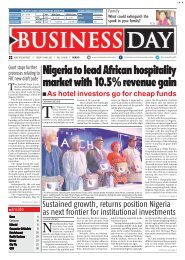business0521
Create successful ePaper yourself
Turn your PDF publications into a flip-book with our unique Google optimized e-Paper software.
32<br />
BUSINESS DAY<br />
INDUSTRY FILE<br />
SBL COUNTDOWN<br />
Meet the speakers…<br />
Thursday 21 May 2015<br />
LegalBusiness<br />
“An enabling environment<br />
competitive advantage in at<br />
The Council of the Nigerian Bar Association Section on Business Law (NBA-SBL) and the 2015<br />
Conference Planning Committee has unveiled the speakers and panelists for the 9th Annual Business<br />
Law Conference, which takes place from Sunday June 7-9, 2015 at the Expo Centre of the Eko Hotel<br />
and Suites in Victoria Island, Lagos.<br />
As we join the rest of the business law community in its countdown to the conference, you will find<br />
here weekly highlights of the conference, its speakers and panelists.<br />
This year, the Annual Business Law Conference will feature an array of dynamic and erudite speakers<br />
addressing topical issues including the impact of global trends on the Nigerian economy, Nigeria’s<br />
ease of doing business and business development strategies for law firms.<br />
Scheduled to speak at the PREMIUM PLENARY SESSION is the Chief economist of PwC’s UK<br />
firm, JOHN HAWKSWORTH.<br />
Based in London, Hawksworth leads<br />
the macroeconomic research and<br />
thought leadership programme covering<br />
not just the UK but also the global<br />
economy more generally. He has over<br />
ON CHINA’S GROWING INVESTMENT<br />
PORTFOLIO IN AFRICA<br />
Much of this investment has been driven by<br />
China’s ravenous appetite for natural resources,<br />
including oil and gas, metals and other minerals. It<br />
All is now set for the 9th Annual Business Law Conference of the<br />
SBL). The conference, which seeks to engage industry regulators<br />
environment, will hold from June 7-9, 2015, at the Eko Hotel &<br />
Q: Regulators as Catalysts for<br />
Economic Growth…” What<br />
informed the theme for this<br />
year’s conference?<br />
By the nature of the work we<br />
do, we have observed over the last few years,<br />
(especially after the international financial<br />
crisis), a growing and sustained international<br />
investment interest in emerging African<br />
economies. We also observed that most of<br />
the long term capital flows have gone into<br />
economies with large markets but markets<br />
which have enabling statutory and regulatory<br />
environments. We believe that an enabling<br />
regulatory environment, where our regulators<br />
are fair, certain, effective and pro-business,<br />
will provide a competitive advantage in attracting<br />
investment flows. So, we decided<br />
that at our conference this year we would<br />
engage our Regulators as it concerns ‘ease<br />
of doing business’ in Nigeria. The objective<br />
is to shape government policies and enhance<br />
business processes in Nigeria. We believe our<br />
Annual Business Law conference is a good<br />
platform to focus on these discussions. It is<br />
fundamental for our economic well being as<br />
a nation that Nigeria is a preferred investment<br />
destination.<br />
25 years of experience as an economics consultant<br />
in the UK and overseas, working with a wide range<br />
of blue chip companies and governments, as well<br />
as international institutions such as the World Bank<br />
and the European Commission. He is also a regular<br />
commentator on economic issues in the UK media.<br />
In this edition, Hawksworth who will be speaking<br />
on the ‘Long-Term Global Economic Trends And<br />
Implications For Nigeria’ shares with us a sneakpeak<br />
of his session at the conference.<br />
HE SAID:<br />
“I will take a look at some of the megatrends<br />
that will influence the development of the global<br />
economy over the next few decades, including demographics,<br />
natural resource scarcity, technological<br />
change and the shift in economic power to China,<br />
India and other leading emerging economies. I will<br />
then discuss the many opportunities this creates for<br />
Nigeria, but also the challenges to be overcome to<br />
realise this great potential.<br />
HE ALSO SPEAKS ABOUT PwC’s WORLD<br />
IN 2050 REPORT AND WHAT IT PROJECTS<br />
FOR NIGERIA?<br />
Our projections suggest that Nigeria could break<br />
into the top 10 economies in the world, ranked by<br />
GDP, by 2050 if it can follow appropriate growthfriendly<br />
policies. But fulfilling this potential will<br />
not be automatic, it requires sustained investments<br />
in infrastructure, education and industrial development,<br />
as well as enhanced political stability and rule<br />
of law (as discussed further below).<br />
is also aimed at getting access for Chinese goods to<br />
fast-growing African consumer markets, not least in<br />
Nigeria. In return, China has made valuable investments<br />
in areas like transport infrastructure. I think<br />
this investment will continue, but it needs to be on<br />
terms that support development of more diversified<br />
domestic economies in Nigeria and other African<br />
countries. The nature of the Chinese investment<br />
may also change as its economy shifts away from<br />
a focus on low-cost manufactured exports towards<br />
higher valued products and domestic-led consumer<br />
growth that may be less resource-intensive.<br />
ON DROPPING CRUDE OIL PRICES AND<br />
WHAT NIGERIA SHOULD DO<br />
In the short term, this clearly poses some challenges<br />
for Nigeria, but there is also an opportunity<br />
if it provides a stimulus to take faster action to diversify<br />
Nigeria’s exports and government revenues<br />
away from their current heavy reliance on oil and<br />
gas. This would make the economy less sensitive<br />
to global commodity price shocks and could create<br />
more skilled jobs in areas like manufacturing and<br />
business and financial services. This would make<br />
growth more stable and sustainable in the long run.<br />
He also speaks on significant demographic dividends<br />
for Nigeria, increased investments, and other<br />
critical issues about this economy. To hear more<br />
and participate in the discourse, make it a date to<br />
attend the 9th Annual Business Law Conference in<br />
Lagos, May 7-9, 2015<br />
How does the chosen theme for each year<br />
drive participation? Are your participants<br />
largely the same every year or would you<br />
say the audience is driven either by the<br />
theme, the sub-topics or the selected panel<br />
at each conference?<br />
It is always important that our theme is contemporary,<br />
relevant, educative and topical to<br />
drive the right kind of feet into the conference.<br />
Participants, who cut across the private and<br />
public sectors, and international investors,<br />
also pay attention to the specific topics and<br />
to the speakers chosen to discuss these topics.<br />
We also have a large primary constituency of<br />
our members who make it a duty to be part<br />
of the conference each year. Participation is<br />
driven by all of these factors.<br />
“ With dwindling<br />
and unstable oil<br />
prices the diversification<br />
of our economy<br />
has become<br />
even more critical.<br />
We must do everything<br />
possible to<br />
attract new long<br />
term money into<br />
other areas of our<br />
economy...”<br />
If yes, who is your target audience for<br />
the 2015 Annual Business Law Conference<br />
(ABLC)?<br />
Our conferences are structured to bring<br />
value to a large target audience, the Public<br />
Sector, the Private Sector, international investment<br />
community, the judiciary and those<br />
in the informal sector of the economy. There’s<br />
a large offering for a wide range of participants.<br />
This year we will focus on regulators<br />
and how their work and the rules they set can<br />
enhance our economic growth.<br />
The ABLC this year has only nine (9)<br />
sessions, albeit fully packed and cutting<br />
across sectors. Is there a particular reason
















